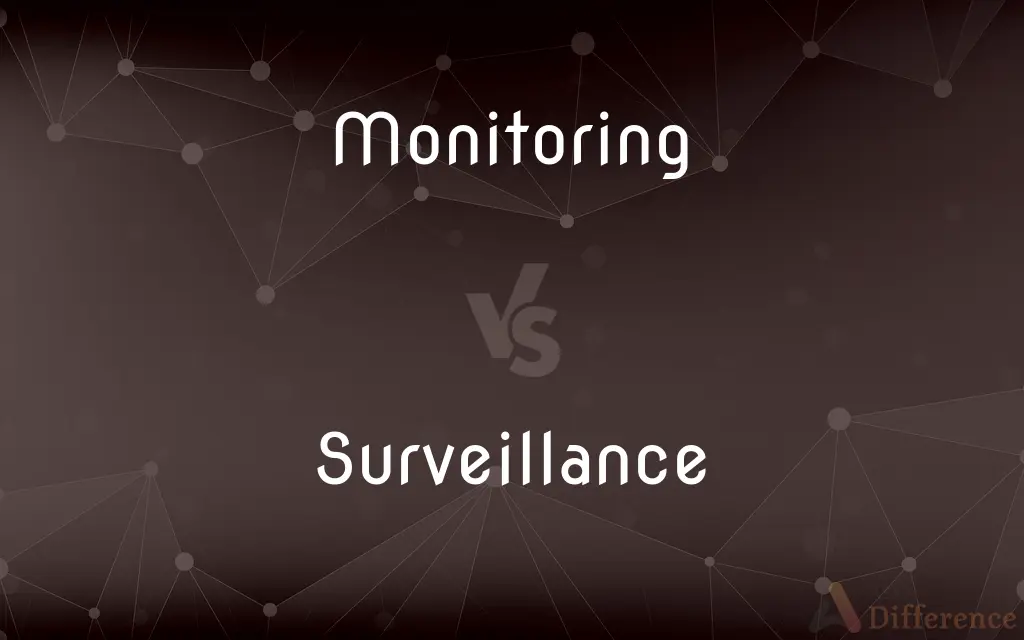Monitoring vs. Surveillance — What's the Difference?
By Tayyaba Rehman & Maham Liaqat — Updated on March 7, 2024
Monitoring involves regularly checking or observing activities or processes for specific purposes, like quality control, whereas surveillance is closely watching over individuals or areas, often for security or espionage.

Difference Between Monitoring and Surveillance
Table of Contents
ADVERTISEMENT
Key Differences
Monitoring is a broad term that encompasses the routine observation and recording of activities, processes, or systems with the aim of ensuring compliance with standards, improving performance, or collecting data for analysis. Surveillance, on the other hand, specifically refers to the systematic observation of people, places, or activities, typically to prevent crime, protect security, or gather intelligence. It often carries a connotation of watchfulness over potential wrongdoings or the protection of public safety.
While monitoring can be a neutral or even positive activity aimed at enhancement and prevention in technical, health, or environmental domains, surveillance is more intrusive, focusing on the behavior of individuals or groups and often involving privacy concerns. Surveillance is usually carried out by government agencies, law enforcement, or security services, whereas monitoring can be conducted by a wide range of entities including businesses, non-governmental organizations, and individuals for diverse purposes like improving services, tracking health metrics, or environmental conservation.
The methods and tools used in monitoring and surveillance can overlap, such as cameras, sensors, and software analytics, but the intent behind their use distinguishes them. Monitoring tools are used to collect data for analysis, optimization, and reporting, often with the goal of improving processes or systems. In contrast, surveillance tools are used to observe and record behavior for the purposes of control, security, or gathering evidence.
Another key difference lies in the scope and focus of these activities. Monitoring is generally targeted and specific, with clear objectives and metrics in mind, such as monitoring air quality in a city or performance metrics of a server. Surveillance, however, tends to be broader and more focused on detecting and preventing unauthorized or criminal activities, which requires a wider and more continuous observation scope.
Privacy implications also differentiate monitoring from surveillance. Monitoring activities, especially in workplaces or research, often come with predefined goals and consent from those being monitored. Surveillance, especially when related to security or law enforcement, might be conducted without the explicit consent of those being watched, leading to significant privacy and civil liberties debates.
ADVERTISEMENT
Comparison Chart
Purpose
To observe and record for improvement, analysis, or compliance.
To watch closely for security, control, or intelligence.
Contexts
Health, environment, technology, quality control.
Security, law enforcement, espionage.
Connotation
Neutral or positive, aimed at enhancement.
Often intrusive, with potential privacy concerns.
Entities Involved
Businesses, NGOs, individuals, researchers.
Government agencies, security services, law enforcement.
Tools and Methods
Cameras, sensors, software analytics for specific objectives.
Cameras, wiretaps, surveillance drones for broad observation.
Scope and Focus
Targeted and specific, with clear objectives.
Broader, focusing on detecting and preventing wrongdoing.
Privacy Implications
Generally involves consent and specific goals.
May be conducted without explicit consent, raising privacy issues.
Compare with Definitions
Monitoring
Observing environmental conditions for changes.
Wildlife monitoring helps in conservation efforts.
Surveillance
Observing individuals suspected of wrongdoing.
Under surveillance, the spy's movements were tracked.
Monitoring
The process of routinely checking systems or processes.
Monitoring the server's uptime ensures reliability.
Surveillance
Watching over areas for security purposes.
Surveillance cameras are installed for public safety.
Monitoring
Tracking health metrics over time.
Monitoring heart rate during exercise provides insights into fitness.
Surveillance
Gathering intelligence on criminal activities.
Police surveillance led to the arrest of the suspect.
Monitoring
Assessing performance metrics in businesses.
Monitoring sales trends helps in forecasting.
Surveillance
Use of drones for border security.
Border surveillance drones detect unauthorized crossings.
Monitoring
Quality control in manufacturing.
Monitoring production lines ensures product standards.
Surveillance
Monitoring communications for espionage.
Government agencies conduct surveillance for national security.
Monitoring
One that admonishes, cautions, or reminds, especially with respect to matters of conduct.
Surveillance
Surveillance is the monitoring of behavior, many activities, or information for the purpose of information gathering, influencing, managing or directing. This can include observation from a distance by means of electronic equipment, such as closed-circuit television (CCTV), or interception of electronically transmitted information like Internet traffic.
Monitoring
A pupil who assists a teacher in routine duties.
Surveillance
Close observation of a person or group, especially one under suspicion.
Monitoring
A usually electronic device used to record, regulate, or control a process or system.
Surveillance
The act of observing or the condition of being observed.
Monitoring
A video display or speaker used in a production studio to check audio or video quality
The sound engineer detected a hiss on the monitor.
Surveillance
Close observation of an individual or group; person or persons under suspicion.
Monitoring
(Computers)A device that accepts video signals from a computer and displays information on a screen; a video display.
Surveillance
Continuous monitoring of disease occurrence for example.
Monitoring
(Computers)A program that observes, supervises, or controls the activities of other programs.
Surveillance
Systematic observation of places and people by visual, aural, electronic, photographic or other means.
Monitoring
An articulated device holding a rotating nozzle with which a jet of water is regulated, used in mining and firefighting.
Surveillance
(legal) In criminal law, an investigation process by which police gather evidence about crimes, or suspected crime, through continued observation of persons or places.
Monitoring
A heavily ironclad warship of the 19th century with a low, flat deck and one or more gun turrets.
Surveillance
Oversight; watch; inspection; supervision.
That sort of surveillance of which . . . the young have accused the old.
Monitoring
A modern warship designed for coastal bombardment.
Surveillance
Close observation of a person or group (usually by the police)
Monitoring
See monitor lizard.
Monitoring
To check the quality or content of (an electronic audio or visual signal) by means of a receiver.
Monitoring
To check by means of an electronic receiver for significant content, such as military, political, or illegal activity
Monitor a suspected criminal's phone conversations.
Monitoring
To keep track of systematically with a view to collecting information
Monitor the bear population of a national park.
Monitored the political views of the people.
Monitoring
To test or sample, especially on a regular or ongoing basis
Monitored the city's drinking water for impurities.
Monitoring
To keep close watch over; supervise
Monitor an examination.
Monitoring
To direct.
Monitoring
To act as a monitor.
Monitoring
Present participle of monitor
Monitoring
The carrying out of surveillance on, or continuous or regular observation of, an environment or people in order to detect signals, movements or changes of state or quality.
Monitoring
The act of observing something (and sometimes keeping a record of it);
The monitoring of enemy communications plays an important role in war times
Common Curiosities
Can monitoring be considered a form of surveillance?
While monitoring can be part of a surveillance strategy, its broader and often less intrusive nature distinguishes it from surveillance.
How has technology impacted surveillance?
Technological advancements have greatly expanded the capabilities and reach of surveillance, raising new privacy and ethical questions.
Do individuals have a right to know if they are under surveillance?
Laws vary, but in many jurisdictions, there are requirements for warrants or legal justification for surveillance.
Can public surveillance reduce crime?
Studies suggest that visible surveillance can deter criminal activity, but its effectiveness varies with implementation and context.
How do businesses use monitoring ethically?
Ethical business practices involve transparent policies on monitoring for performance, security, and compliance, often with consent from those monitored.
What legal protections exist against unauthorized surveillance?
Many countries have laws governing the use of surveillance, including requirements for warrants and prohibitions against unreasonable searches.
How do monitoring and surveillance intersect in cybersecurity?
Both are used in cybersecurity: monitoring to detect potential threats and vulnerabilities, and surveillance to investigate and prevent cyber crimes.
Is monitoring always done in real-time?
Not always; monitoring can be real-time or periodic, depending on the objective and context.
Can surveillance be justified on ethical grounds?
Yes, when conducted lawfully and with oversight, surveillance can be ethically justified for public safety and security.
What are the privacy concerns with workplace monitoring?
Concerns include the extent of monitoring, the data collected, and how it is used and stored.
Share Your Discovery

Previous Comparison
Rhodopsin vs. Opsin
Next Comparison
Cone vs. ConicalAuthor Spotlight
Written by
Tayyaba RehmanTayyaba Rehman is a distinguished writer, currently serving as a primary contributor to askdifference.com. As a researcher in semantics and etymology, Tayyaba's passion for the complexity of languages and their distinctions has found a perfect home on the platform. Tayyaba delves into the intricacies of language, distinguishing between commonly confused words and phrases, thereby providing clarity for readers worldwide.
Co-written by
Maham Liaqat















































